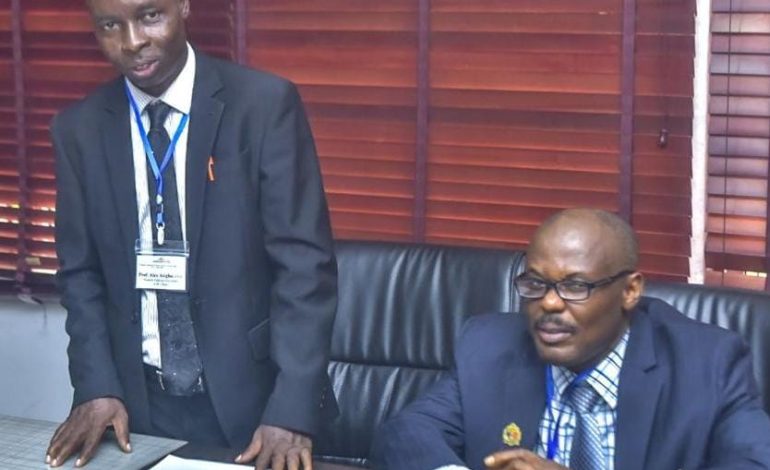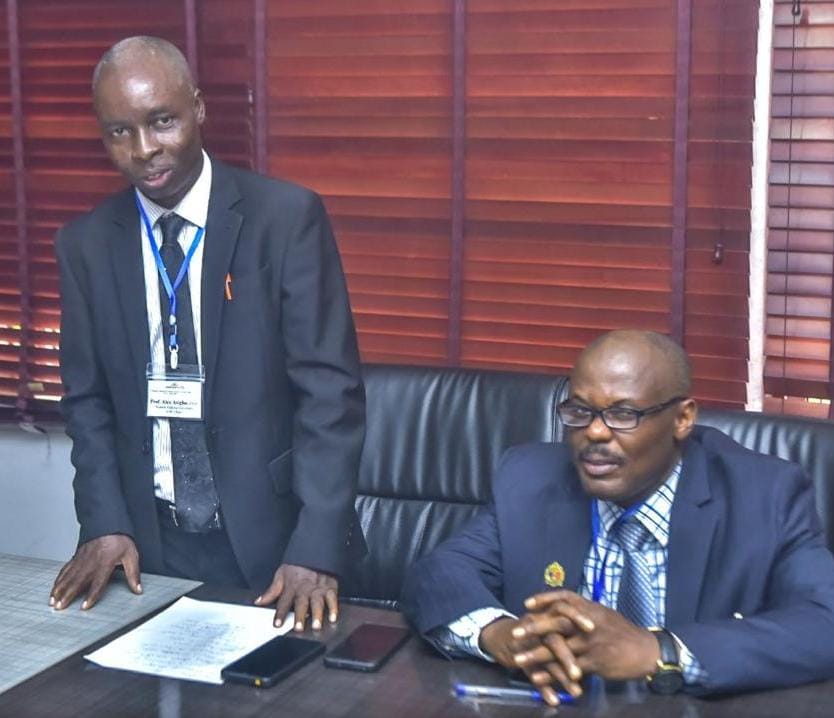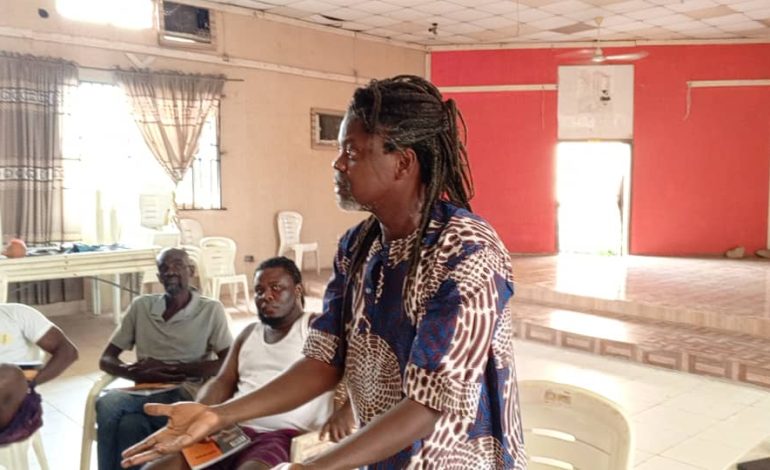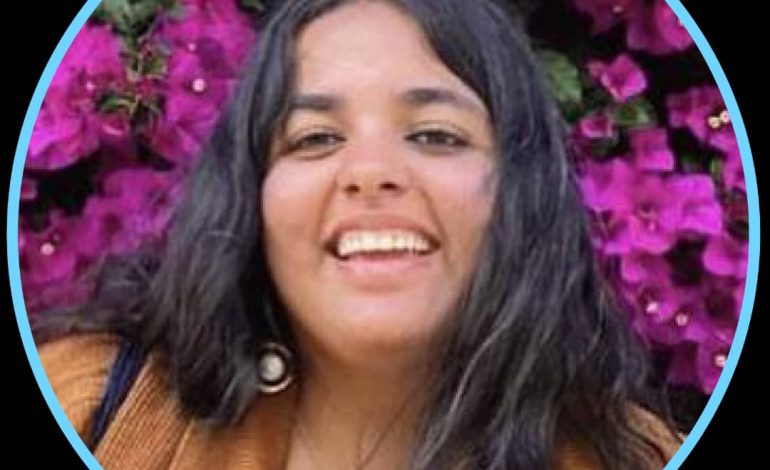‘Our art has not been able to change society; artists need to attain leadership positions’

‘The artist is meant to be the voice of the people, and they must listen to the people’
By Godwin Okondo
RECENT developments and pronouncements from government and agent of government have given rise to uneasiness across a wide spectrum of the artistic community. It’s either there is total ban or partial restriction on what artists can do or use in their works to express themselves creatively. From The Nigeria Police to other security agencies and the National Film and Video Censors Board, there has been real cause for alarm on their stiff stance that seem to threaten artistic express. Arts and politics have always lived cat and mouse lives, each mutually suspecting the other, but at what levels should they interface for the mutual benefits of the society they both claim to serve? This served as the crust of the matter recently when some eggheads in Nigeria’s Ivory Tower, led by the Nigerian Academy of Letters (NAL), met in Awka to deliberate on the intersection of art could use activism and advocacy to achieve political benefits for society.
The academics held its biennial conference on Wednesday, June 19, 2024 in Awka, the Anambra State capital, to discuss the roles artists have played and will continue to play in their activism and advocacy through their craft for a better political climate for Nigeria. The event had as theme ‘Art and Political Expression: Exploring the Intersection of Creativity and Activism.’ It had a 4-man panel session that featured lecturers from the Department of Theatre Arts, University of Ilorin, Dr. Bode Ojoniyi, lecturer in Drama, School of Creative Arts & Technologies, Ulster University, Belfast, UK, Dr. Matthew Jennings, Dr. Ike Irojikwe and a lecturer at the Department of English and Literary Studies, University of Nigeria, Nsukka, Rev. Sr. (Dr.) Adaoma Igwedibia and the panel session moderator and theatre activist, Om’Oba Jerry Adesewo. Other guests included the chief host and President of Nigerian Academy of Letters (NAL), Prof. Sola Akinrinade and the LOC Chairman, Prof. Alex Asigbo.
Irojikwe spoke on how artists can survive and maintain self-expression in oppressive political climates, when he said, “One crucial thing we must acknowledge is that artists need to secure their survival before they can effectively engage in activism. Over the years, we have essentially been living in captivity, confronting countless situations where artists are unable to express themselves as they should. The question we face is: how can we survive and lead fulfilling lives in a political climate where leaders show little regard for the well-being of the people? The environment for artists has been increasingly stifling, making it difficult for them to connect with and reflect the socio-political realities they experience. In such a repressive context, it becomes imperative to create and support more programmes like this one. These programmes provide a vital platform for discussing and developing innovative strategies to challenge the status quo.”
Dr. Igwedibia also spoke on why creative expression and socio-political activism should be leveraged to support upcoming Nigerian artists, noting that “There is a nexus between creative expression and socio-political activism. Every writer draws from personal experience, and we have countless creative writers with diverse stories and messages to share. When you examine their works, you’ll find many who have depicted political landscapes, both within the country and globally. Artists have historically played significant roles in politics across different regions of the world, and many emerging artists are now striving to highlight and critique Nigerian policies through their art. This growing body of work underscores the important role artists play in shaping and reflecting political discourse.”

Conference LOC Chairman, Professor Alex Asigbo (left) and Secretary, Professor Greg Obiamalu
And for Dr. Jennings, “I’ve done extensive work on the conflict in Northern Ireland, and through my experience, I’ve realized that the only way to preserve the story of Ireland as a nation is through the arts. Art has a unique power; it can be weaponized to serve both sides of a conflict, shaping narratives and influencing perceptions. By teaching people different artistic concepts, we help them develop their skills, enabling them to become advocates for themselves and their communities.
“For example, we implemented a similar approach with nurses at a hospital. We introduced them to drama and playwriting, providing them with tools to express themselves more easily and creatively. This artistic engagement did more than just enhance their communication skills; it empowered them to share their personal and professional experiences in a compelling way.
“Artistic expression becomes a powerful means of advocacy and storytelling, allowing individuals to articulate their perspectives and emotions in ways that traditional methods might not capture. In the context of the Northern Ireland conflict, as well as other socio-political issues, using the arts as a medium for expression and education can lead to profound understanding and healing. It fosters a sense of shared experience and community, while also giving a voice to those who might otherwise remain unheard. By incorporating arts into advocacy and conflict resolution strategies, we can preserve histories, promote empathy, and encourage constructive dialogue.”
Jennings also harped on the imperative of arts to serve as a tool for advocacy and community cohesion of diverse socio-political backgrounds, as it pulls diverse and disparate entities unto itself through its empathetic leaning.
“There are key areas where the arts can significantly support political change,” he said. “The first is advocacy. Through the arts, we can utilize literary records and creative works to build powerful advocacy campaigns. Art has the ability to convey messages and emotions in ways that resonate deeply with people, making it an effective tool for raising awareness and mobilizing support for political causes.
“Another key area is community. The arts have a unique capacity to bring together individuals from diverse backgrounds, fostering a sense of unity and shared purpose. By creating spaces where people can gather to talk, organize, and exchange ideas, the arts help build strong, cohesive communities. These gatherings not only promote dialogue and understanding but also empower individuals to take collective action.”
For Ojoniyi, inclusiveness and fighting for community survival are keys his champions in his artistic engagements and would ensure justice is served first than personal interests.
“The issue of survival will always be present, but the question is: would you abandon the cause of sound justice just to ensure your own survival?” he asked rhetorically. “Will you align yourself with these leaders simply to protect your own interests? The dilemma of survival is perpetual, but what is truly important to me is fighting for inclusiveness and advocating for the needs of the people. It’s about making a choice between compromising our principles for personal safety and standing firm in our commitment to justice and equity. For me, the latter is non-negotiable. The fight for inclusiveness and addressing the needs of the community must always come first, even in the face of personal challenges and threats.”
Former President of Association of Nigerian Authors (ANA), Mallam Denja Abdullahi, said art must always advocate for a better society. Artists cannot side with the establishment against the people. Over the years, our art has not been able to change society to what we want. So, how do we measure the impact of our arts on society? Artists must be socially responsible regardless of the artist’s survival. We are concentrated largely on advocacy and entertainment. We need to be active participants and seek to attain leadership positions and use the platform to make out arts relevant in activism.
No one became successful by chasing success, Jennings noted, adding that “By connecting with international movements, artists can reach broader audiences and amplify their impact. When an artist creates work that resonates deeply with people, it becomes successful and influential because it imparts valuable lessons and perspectives. Art can educate and inspire, offering insights that empower individuals to make meaningful changes in their lives and communities. I believe that impactful art inherently taps into socio-political movements, as it reflects and responds to the issues and aspirations of society. Thus, artists who engage with these movements not only enrich their work, but also contribute to larger dialogues and efforts for positive change.”
NAL president, Prof. Akinrinade lent his voice to the debate when he said that artists convey messages with what they write, adding, “What kind of message are you conveying despite the need for survival? How do you encourage people to become active participants in governance? The artist is meant to be the voice of the people, and they must listen to the people.”




